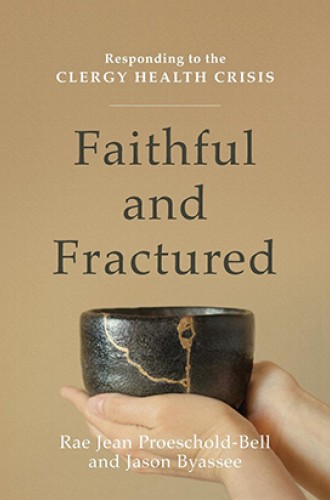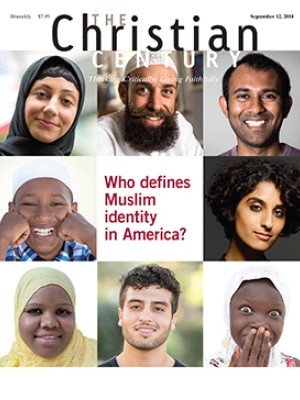Putting clergy health in perspective
Pastors and their complex relationship with their work—and with themselves
A psychotherapist colleague recently called me to consult about a client who is a pastor. She lacked the background to understand the complications of pastoral life. I recommended she read Faithful and Fractured. It is a useful primer for those who would understand the inner landscape of pastors—therapists, pastoral supervisors, congregational lay leaders, personnel and search committees—and its strong reliance on the language of social science makes the book accessible to a wide audience. Field education directors and others responsible for training clergy could also benefit from the book as they create curricula that attend to the personal competence that funds professional excellence. And clergy groups might read it together, as it reminds pastors of what they already know about the vulnerabilities of highly relational work and of best practices—rest, exercise, healthy eating, time for family and friends, and the cultivation of close colleagues and good mentors—that have been the subject of clergy training for nearly a generation now.
The book’s subtitle situates it within the more recent genre of pastoral literature responding to the perception that contemporary clergy are in serious trouble—a perception fueled by larger concerns about religious life and leadership in our complex culture, the rise of anecdotal (and often ambivalent) accounts of clergy life in memoirs and blog posts, and some ambitious but ultimately unreliable studies generated by anxious church consultants over a decade ago.
Read our latest issue or browse back issues.
Amy Frykholm took issue with those dire diagnoses in her recent Century article “The pastors are all right” (May 8), citing Rae Jean Proeschold-Bell’s work with Duke University’s Clergy Health Initiative as a source of more rigorous and responsible data on clergy health. CHI’s decadelong research project with United Methodist clergy in North Carolina supplies the substance of Faithful and Fractured, with Proeschold-Bell offering transparent, accessible, and empowering interpretations of the study’s nuanced findings, presented in tandem with Jason Byassee’s conversational reflections on the pastoral life.
Unlike the earlier research that caused much hand-wringing in the clergy community but resulted in little perceptible change in pastoral quality of life, CHI utilizes multiple research instruments, including longitudinal surveys, focus groups, qualitative interviews, and biometrics. The study’s rich data yield textured understandings about pastors’ experiences of depression and stress, the factors that complicate clergy’s physical health, and the varieties of ways that pastors cope—or fail to cope—with their complicated profession. While the research sample was limited to Methodist clergy, most of the book’s insights are not denominationally dependent. Many clergy will recognize aspects of their own experience regardless of their institutional affiliations or the degree to which they would identify themselves as “fractured.”
The volume’s signature accomplishment is its apprehension of, and corresponding appreciation for, pastors’ complex relationships with themselves, their work, and their lives. The title conveys the compelling evenhandedness with which the authors make their case: as a profession, clergy are both faithful and fractured. Proeschold-Bell and Byassee do not deny the hard realities of pastoral work and the challenges to clergy wellness suggested by the profession’s higher-than-average rates of depression, stress, and obesity. The book takes these difficulties seriously enough to devote an entire chapter to each of the three conditions, exploring their possible underlying causes and cataloguing reasonable—if too familiar—prescriptions for wellness.
At the same time, the authors resist the simplistic conclusion that these liabilities define contemporary pastoral work, nor do they forecast a gloomy future for those who aspire to ministry. In fact, the opening paragraphs of the book remind readers of the 2006 study that identified clergy as having the highest rates of job satisfaction in the United States. Proeschold-Bell refers to the powerful resilience and creativity that can result from pastoral meaning making and spiritual practice, and Byassee’s commentary often reminds readers of the efficacy of the gospel and the goodness of this work. The book’s final chapters seek to build on these strengths, advocating an intentional and informed balance in pastoral practice and introducing the language of positive mental health and the practice of positive emotions alongside narratives that highlight the healthy strategies of flourishing pastors.
Faithful and Fractured would benefit from theological reflection that is as far-reaching and thorough as the social science on which the work so heavily relies. Of over 220 references in the book’s bibliography, fewer than a dozen entries refer to theological works, scripture, or other literature; the rest cite research books and studies. Byassee’s “behind the pulpit” contributions (an unfortunate title, perhaps, for lively theological engagement!) are much needed if the volume is to model the balance it advocates, but these short bits are more ingratiating than they are grace-filled or groundbreaking. Pastoral theology that stays “behind the pulpit” may not be enough to galvanize the lively meaning making that is the beating heart of pastoral life.
In their book Immunity to Change, Robert Kegan and Lisa Laskow Lahey assert that successful behavioral change (like the adoption of all those best practices) requires that we reckon with our most deeply held convictions and assumptions. We can’t change how we act unless our behaviors are deeply rooted in who or what we truly are—and who or what is really at the center of our world. This discernment is the work of theology.
Religious leaders, no matter how healthy, can still find themselves enervated by the hard work of building community, stimulating their congregations’ desire for the holy, and reviving our culture’s moral imagination. Many of the pastoral voices in Faithful and Fractured echo Kegan and Lahey’s call for the rich introspection that is the natural habitat of contemplation and theological reflection, the deep work that undergirds all change. Proeschold-Bell and Byassee set the stage by reminding clergy that we are both faithful and fractured. Hopefully, the next contribution to the clergy crisis literature will offer a theological model for what we must yet become: fearless and future-leaning.






